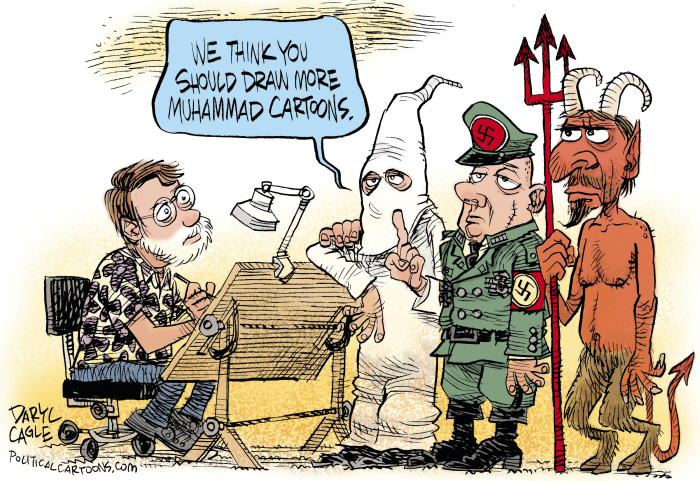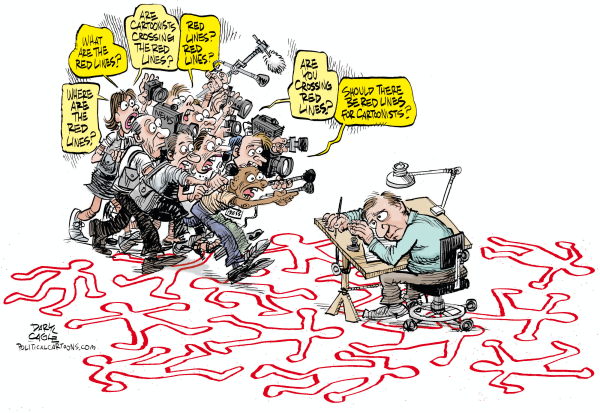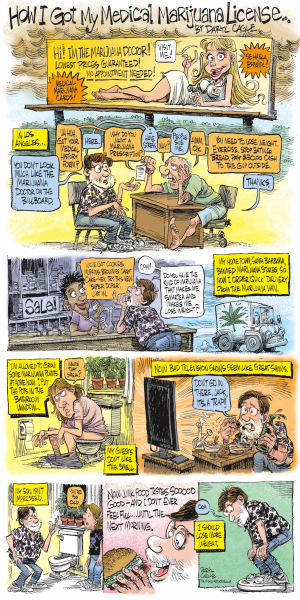
Now I know how Mitt Romney felt when he was dogged by complaints about his “flip-flopping”. Nothing makes editorial cartoonists angrier than another cartoonist who changes his mind.
There was a short lived debate about whether a Miranda warning should be given to Boston bombing suspect, Dzhokhar Tsarnaev, who had been questioned without being given the warning. I drew a cartoon featuring Dzhokhar with two other, famous killers, and a caption that concluded that “none of them” deserved a Miranda warning. I got no response from editors or other cartoonists to this cartoon, but I got such a strong reaction from readers against the cartoon, with many well reasoned arguments, that I changed my mind — something that doesn’t happen much in the editorial cartooning profession.
I remember when the Miranda decision came down in the 1960’s, on a 5-4 vote. It was controversial for a long time. Liberals liked it, conservatives still don’t like it. The Miranda debate resurfaced when Dzhokhar was questioned without being given a Miranda warning, a topic that filled editorial pages for nearly a week.
Of-course Dzhokhar doesn’t personally deserve any special consideration, but the American people deserve to have civil rights that are applied consistently to all, including the most heinous killers. Most of the reader responses to my cartoon conflated reading the Miranda warning to Dzhokhar with Dzhokhar’s overall civil rights; I have come to the conclusion that this is a good thing. I see now that the Miranda warning has become a part of our national fabric and I changed my mind. I really read the arguments that readers send to me. I drew a new cartoon that showed a revised conclusion that “all of” the killers deserved to be read their Miranda warning.
Then I learned that, as I was drawing the revised cartoon last Monday, Dzhokhar was read his Miranda warning, so I doubt that my second cartoon got reprinted much. Even so, the talking heads on TV were engaging in renewed debate about the wisdom of giving the Miranda warning in this case, which caused the suspect, Dzhokhar, to stop “talking.”
I’ve changed my mind before, not often, and usually over a longer period of time, but I won’t go back into my online archive to delete my regrettable old cartoons. I posted them, I should live with my history. So both versions of my cartoon are still posted on my web site. (My old cartoons supporting the run up to war in Iraq are still posted too — I’m more embarrassed by those.)
I got almost no response to the second version of the cartoon from readers or editors, but there was an angry torrent of responses from my fellow editorial cartoonists. Some of my colleagues blogged that I had a new, insidious business plan to make more money by offering two versions of the same cartoon, for both liberal and conservative editors — to sell twice as many cartoons with only one drawing. Others agreed, adding that I was cheapening the profession with this crass, two-faced commercialism.
One political cartoonist blogged that my cartoon was no editorial cartoon at all (and by extension, that I am no editorial cartoonist) because editorial cartoons must, by definition, express only one opinion. Another editorial cartoonist raged at my cartoon in his blog by calling me the “Osama Bin Laden” of editorial cartooning.
Some cartoonists wrote that I must surely be lying about my reason for changing the cartoon, because the idea that I would change my mind was simply not credible. Others called for me to be punished for my breach of the unwritten laws of cartoon ethics. Some demanded that I be thrown out of our professional organization.
Other editorial cartoonists demanded that I remove the old version of the cartoon from my archive, as I would do with a cartoon that was revised to correct a spelling error. The idea that an editor could purchase and print both versions of the cartoon, with two different opinions, was repugnant. Bloggers and journalism sites reported on the cartoon controversy.
Yes, the cartoon police really do exist.
I know this all sounds unbelievable, but I’m not exaggerating. It is fascinating that editorial cartoonists have such a different perspective on their own work than editors and readers do. We editorial cartoonists take ourselves far more seriously than anyone else takes us.
I’m tempted to resist this cartoon police brutality. When I’m arrested, I hope they read me my Miranda warning.
Daryl Cagle is a cartoonist who runs the CagleCartoons.com newspaper syndicate distributing editorial cartoons to more than 850 newspapers around the world including the paper you are reading now; he is a past president of the National Cartoonists Society. Comments to Daryl may be sent to [email protected]. Read Daryl’s blog at www.cagle.com/daryl.















